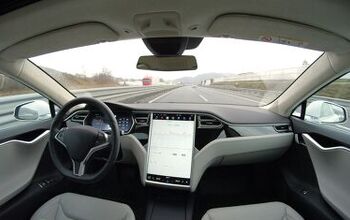DOT Dozen Call For Congress To Focus On Long-Term Of Infrastructure Funding
Alongside 11 former U.S. Department of Transportation secretaries, current secretary Anthony Foxx urged both houses of Congress to find a long-term solution to the funding of the U.S. Highway Trust Fund beyond what is under consideration at present.
According to Autoblog, Foxx notes that while he and his comrades — going back 35 years and 7 presidents in total — are hopeful the upcoming funding bill will go through, he states that the current unpredictability of the crisis-to-crisis method of governance over the past few years “is no way to run a railroad, fill a pothole, or repair a bridge.”
The DOT Dozen are calling, instead, for Congress to consider the long game regarding the nation’s infrastructure: 100 million new people and 14 billion tons of additional freight by 2050. There, they see some hope among the Beltway leadership to come up with ideas to remedy the issue, though finding consensus within the houses will take some time.
In the near term, Foxx explains that as much as $1.8 trillion will need to be spent by 2020 to bring surface infrastructure up to an adequate state, including the group of structurally deficient bridges whose number is great enough to connect Miami with Boston if laid end-to-end.
Seattle-based writer, blogger, and photographer for many a publication. Born in Louisville. Raised in Kansas. Where I lay my head is home.
More by Cameron Aubernon


































Comments
Join the conversation
One other thing, the misplaced mindset among a subset of Americans including many in high places in government that has been fostered by decades of propaganda, is the mistaken belief that a publicly owned realm created by laws and taxes by an electorate and its representatives in a elected government, is the same thing as (dreaded buzzword) SOCIALISM!!!!! , and of course all and any socialism is inherently pure evil to avoided at all costs. Long sentence, I know . . .
I think we could start by returning to the situation where motor fuel taxes exclusively pay for roads and bridges . . . not "light rail" projects, bike paths and so on. While I realize that, in percentage terms, it's not all that much that gets diverted, it's the optics of the thing. Here in the Capital of the Free World, I get the benefit of metro Washington's expensive subway system, paid for in part by taxpayers in the rest of the country. If I lived in, say, Wyoming, where driving large distances in something other than a TDI or a Prius (e.g. a pickup truck) is a way of life, I would feel pretty pissed off that my motorfuel tax money is paying for a light rail project in Baltimore or a subway in metro Washington. With better optics, perhaps getting support for raising the taxes would not be so tough. A second, continuing battle, of course, is whether heavy (over 5 tons GVWR) trucks pay their fair share of road use taxes, given, no doubt, that they create a lot more wear on the roads. I recall driving cross-country about 14 years ago and I-40 was positively rutted in the right lane from trucks. It was punishing to drive in that lane, the rutting was so bad. Now, this may indicate poor roadway design, but it also indicates the wear generated by heavy trucks. The reason people don't support tax increases is because they don't believe the government is honest any more. The average motorist doesn't have a strong lobby like the trucking industry, so most people reasonably believe that over-the-road trucks get off comparatively easy when it comes to motor fuel and other taxes. And they look at the rich guys owning $90,000 EVs who don't pay any taxes, while even the guy with the Chevy Spark (which weighs a lot less) pays taxes, and they scratch their heads. And then they look at money diverted for projects that benefit a handful of often wealthy (as in metro DC) metropolitan areas that are funded by motorfuel taxes and they scratch their heads a little more (especially because many folks in those areas, especially New York City, either don't own a car at all, or drive much less than average and therfore pay much less motorfuel tax. I have not quite broken 75,000 on my 13-year old BMW, as an example. This is what happens when the government loses the trust of its people: they don't want to pay; they want to keep what money they have because they don't have confidence that the government will spend them money "as advertised."
Investment in public infrastructure? Socialism!
Gas obviously isn't expensive enough if the #1 selling vehicle is a full-sized pickup. Taxing gasoline a $1 or $2 per gallon to be on par with other global markets and fixing the roads/bridges would make sense. Seems people would rather drive an F-150 on rough roads than a compact car on a better road surface.